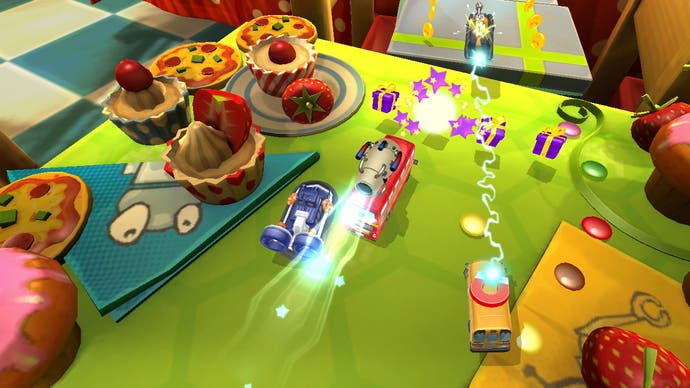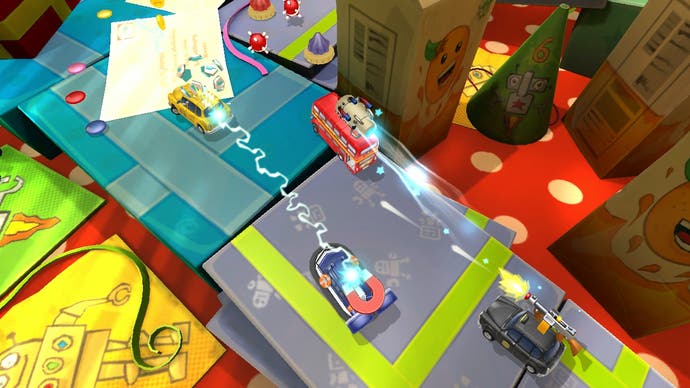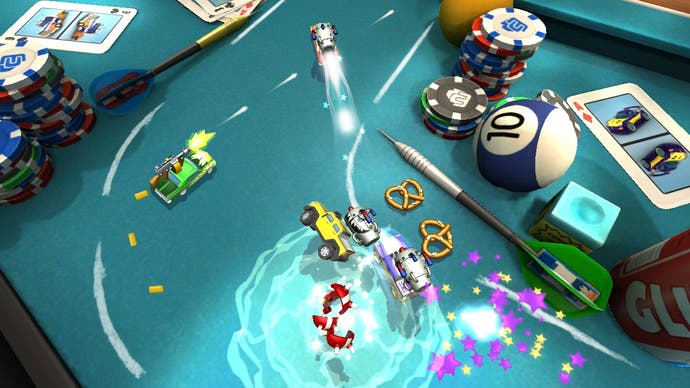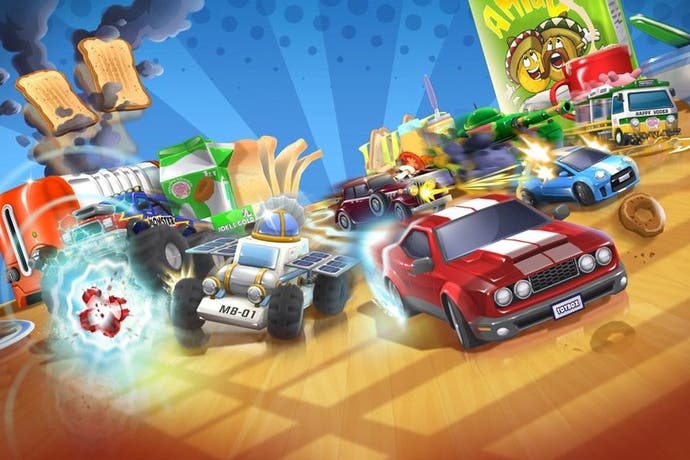Toybox Turbos review
My chroma sheens.
It's rather sad that while Toybox Turbos sees Codemasters reviving the top down racing genre fairly successfully, it's had to do so without the Micro Machines toy license that retro fans will remember.
Despite the name change, this is as faithful a resurrection as you could hope for. The 16-bit titles have retained their cult popularity, thanks largely to simple gameplay and an immediately appealing concept, and this nostalgic tribute isn't about to deviate from that beloved formula.
That means 35 miniature vehicles to unlock, ranging from New York taxi cabs to super-fast dragsters, with everything from bulldozers to moon buggies to monster trucks in between. You race these dinky rides around over-sized tracks set in familiar settings: a kitchen table set out for breakfast, school desks, science labs, snooker tables and toy room floors.

It was a delightful idea back in 1991, and it's still incredibly charming today - not least because this is a sub-genre that has seen depressingly few entries over the years. Aside from Mashed on the PS2, and the more recent Table Top Racing on the Vita, fans of this very specific racing niche have been starved of attention.
Attention is exactly what Codemasters lavishes on Toybox Turbos, right down to details such as dusting off the original company logo for the backs of playing cards strewn across certain tracks. Xylophones tinkle as you use them for a bridge, jellies serve as impromptu trampolines and pop-up toasters propel you into the air. If you're not too fussed about winning, you can even stop and read the amusing synopses written on the back of a series of children's books called "The Tales of Watson Jr".
Handling is appropriately chunky, with enough bounce to be fun, but enough traction that you don't feel out of control. The different vehicles are grouped by class - Construction, for example, or Emergency Vehicles - and offer minor differences in speed, control and weight. Each grouping also includes one boss vehicle, that must be defeated in single player in order to be used.
As fun as the selection is, there's not much point in choosing some of them. Within each group there's one that hits the sweet spot between speed and handling, so you may as well stick with it unless you like losing. The tracks and race types certainly don't offer enough variation that the decision to favour speed over handling, or vice versa, has any real tactical merit.

That also rings true for the weapons, collected from bouncing purple gift-wrapped boxes. Some will elicit an immediate smile of recognition - witness the giant cartoon mallet that pounds anyone in front of you - but it's a shame that this area of the game hasn't seen more new ideas. Roof-mounted machine guns, electrical blasts that zap nearby cars, mines that plop out of the back...it's all a little over-familiar, and while it's still fun to catch a friend out with one of these tried and trusted gizmos, you'll quickly wish there was something here you hadn't seen twenty years ago.
This is a genre that has endured because of its party game multiplayer, but Toybox Turbo makes some odd choices in this regard. For one thing, the single player side of the game is far more varied, with a host of event types including classic races, time trials, overtaking events where you must speed past a set number of AI racers before the laps run out, races where you must stay ahead of an all-devouring blue light and countdown challenges where you must collect clocks to keep the timer from expiring. These rule sets don't change the core gameplay drastically, but they do keep things from getting stale during the two hours or so it will take to blitz through them all and unlock everything.
Bizarrely, however, there is only one race type available in multiplayer. It's the classic elimination mode that fans will remember, in which any racer who falls behind and vanishes off-screen is out of the race. It's still a lot of fun, but even with the game's generous selection of tracks, it wears thin pretty fast when played remotely.

The entire reason this style of play was invented was because Micro Machines was developed in a pre-internet era where local play meant coming up with a way for all racers to use the same screen. That's no longer an issue, clearly, yet when playing online the game will only ever let you play as if you're sharing one screen.
There are other speed bumps as well, not least the fact that you earn no coins from multiplayer races, meaning you'll have to rinse the single player events to get access to all the vehicles. That doesn't take long, but tracks begin to repeat around halfway through the "campaign" and the boss races are annoying rather than challenging.
That's thanks to a physics engine that seems developed for knockabout amusement rather than precision racing, and while that's fine for most of the time, it leads to frustration whenever you lose a hard-earned lead thanks to a weird bounce, a cute piece of novelty track debris jamming your wheels or one of the many instant death obstacles littering the tracks. Vehicles will either fall from the track or magically stick to its edges at the roll of the dice, and when watched closely the collision detection isn't as exacting as you'd hope. Cries of foul play are part and parcel of the genre, but here they'll sometimes have a point.
It's hard not to see the ways in which this could have been more ambitious, more innovative in the way it dusts off the past, but equally it's hard to blame Codemasters for simply giving Micro Machines fans exactly what they wanted, just how they remembered it. As a budget-priced reminder of simpler times, Toybox Turbos does everything it needed to, but sadly not much more. Here's hoping it leads to a genre revival - and a bolder sequel.

